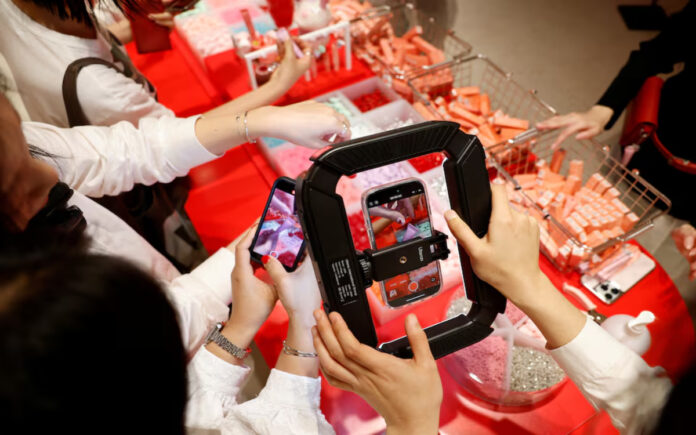Seoul/New York: South Korea’s K-beauty startups, riding a wave of explosive online popularity in the United States, are expanding into brick-and-mortar retail with confidence that their mass-market appeal will help cushion the blow from mounting tariffs.
Emerging brands like Tirtir, d’Alba, Torriden, and Beauty of Joseon are actively in discussions with major U.S. retailers to bring their products to shelves nationwide, company executives told Reuters. Their success reflects a growing appetite for Korean beauty products—driven by competitive pricing, high quality, and savvy marketing rooted in the global popularity of Korean pop culture.
“K-culture — things like PSY in the past, BTS, and then Korean dramas and films like ‘Parasite’ — those really paved the way,” said Tirtir CEO An Byung-Jun.
“In the U.S. market, there was already growing interest in South Korea. Then Korean cosmetics entered the scene. The quality was good, but the prices were lower than the existing luxury brands like L’Oreal or Estee Lauder.”
Tirtir saw a major breakthrough last year after its cushion foundation—designed to suit darker skin tones—went viral online. The product is set to debut at selected Ulta Beauty stores in the U.S. this summer. An added that Tirtir aims to double its U.S. sales in 2025 despite the threat of tariffs.
U.S. retailers including Sephora, Ulta Beauty, Costco, and Target are in talks with Korean beauty brands to bring more of their offerings to physical stores, according to a dozen interviews conducted by the international news agency Reuters with industry insiders and executives.
Despite concerns over U.S. trade policies—especially potential 25% tariffs set to take effect in July—K-beauty firms remain optimistic. Many maintain cost advantages by outsourcing production to specialized manufacturers like Cosmax and Kolmar, often referred to as the “Foxconns of fast beauty.”
In 2024, South Korea overtook Germany to become the world’s third-largest beauty product exporter, behind only France and the United States. A staggering 80% of the country’s $13 billion cosmetics production is exported, with e-commerce fueling the surge.
The U.S. remains a key growth frontier, especially as exports to China—the largest market for K-beauty—have declined amid geopolitical tension and rising domestic competition.
For visitors like Yuliet Mendosa, a 25-year-old from the U.S. and a fan of K-pop sensation BTS, the appeal of K-beauty is both personal and practical.
“They go straight to the point to fix what you need to fix and your skin,” she said while shopping at an Olive Young store in Seoul.
A Changing Trade Landscape
The U.S. expansion comes at a time of heightened trade uncertainty, with former President Donald Trump’s tariff policies still casting a shadow over global commerce. However, Korean brands believe their strong demand and value proposition can weather the storm.
Jin Se-hoon, Executive VP of Olive Young’s global platform, confirmed plans to open the brand’s first U.S. store in Los Angeles by year-end.
“The U.S., especially California, has by far the most customers for our global online shopping platform,” he said, adding that while tariffs are a concern, they haven’t dampened consumer enthusiasm.
Skincare label d’Alba, known for its vegan mist serums and sunscreens, is also negotiating distribution with major U.S. retailers including Costco and Ulta. Meanwhile, Sephora will introduce Torriden and Beauty of Joseon at its stores this summer, according to a spokesperson.
Also Read | CBO Projects Economic Slowdown from Trump Tariffs, Despite Deficit Reduction
Although companies like Tirtir consider the existing 10% tariff “endurable,” An acknowledged that the upcoming 25% levy may lead to price increases. “We might have to raise prices a little bit,” he said.
Seoul is currently seeking tariff exemptions through trade discussions with Washington.
Jung Jun-ho, strategy lead at The Founders (maker of Ulta-stocked Anua skincare), said the company is better positioned than competitors to absorb higher costs thanks to an operating profit margin above 30% last year.
K-Beauty’s Niche Strength
South Korea surpassed France in 2024 to become the top cosmetics exporter to the U.S., largely due to e-commerce platforms like Amazon. According to Euromonitor, the top five Korean brands in U.S. online sales—including Beauty of Joseon, Medicube, and Biodance—saw average growth of 71% over two years, compared to 15% for top French competitors.
Social media remains a game-changer in fueling this rise.
“Nowadays a single viral TikTok video or influencer endorsement can turn a product into a global bestseller before it even launches outside Korea,” said K-beauty marketer Odile Monod.
Also Read | Cuban Students Demand Affordable Data as Boycott Calls Spread
However, analysts caution that continued growth will require success in offline retail too. Jason Kim, CEO of distributor Silicon2, noted that the industry faces saturation risks and growing price competition. Brands like COSRX, now under AmorePacific, have already seen signs of plateauing performance.
Still, investor confidence remains strong. Shares of d’Alba Global have more than doubled since their IPO in May.
“The K-beauty trend is strong,” Kim said. “But indie brands will face challenges too.”



